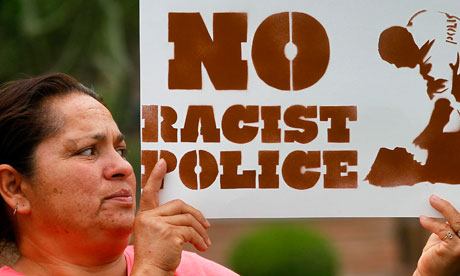
Andrés Garcia: (917) 340-6850; andres.nynice@gmail.com
Valeria Treves: (917) 324-3305; valeria.nynice@gmail.com
(español abajo)
Day Laborers Demanded Back Wages For Their Work
and an End to Contractor Impunity
Saturday, May 5, 2012
10:30 a.m.
38-01 Corporal Stone Street, Bayside, Queens, New York
This past Saturday, May 5th, members of New Immigrant Community Empowerment (NICE), a worker center in Jackson Heights, and their allies held a demonstration outside the office of Bongjun Park of Well-S Industrial Inc. to demand back wages and respect.
Park and his company were hired by Yong Jin Kim of Keystone Growth Corporation for a construction job at the Dwight School, an elite private school on Manhattan’s Upper West Side. Park owes over $90,000 in back wages and damages to eight immigrant workers who did grueling excavation work.
With the legal assistance of the Community Development Project at the Urban Justice Center, workers have demanded unpaid wages from Park. Unfortunately, he has refused liability, claiming that the general contractor, Kim and Keystone Growth, did not pay him.
“Day laborers are often hired by subcontractors, rather than by the contractor that has the contract with the property owner,” says Valeria Treves, Executive Director of NICE. “What develops is a chain of contracts, with employers robbing workers of their salaries and simply passing the buck on to someone else. The Park/Kim case, is a classic example of that”
“Construction is one of several low-wage industries where multiple layers of subcontracting make it harder for employees to recover unpaid wages from the responsible employers,” said Tsedeye Gebreselassie, a staff attorney at the National Employment Law Project. “Unscrupulous employers frequently hide behind subcontracting arrangements to argue that they are not the worker’s employer in an attempt to evade responsibility for basic wage and hour standards”.
“Day laborers across the country are facing more and more instances where employers utilize subcontracting schemes to avoid paying their workers. Bongjun Park and other construction employers must hear this message loud and clear – day laborers will not be silent in the face of this exploitation,” says Nadia Marin Molina, Worker Rights Program Coordinator/ Staff Attorney at the National Day Laborer Organizing Network.
“It is a scandal that Mr. Park refuses to pay workers who worked for him,” says Andrés Garcia, Worker’s Rights Organizer at NICE. “If he hires someone, he has to pay them. That’s the law.”
“We decided to stand up against Mr. Park because we know that he will just continue to do the same to other workers after us. We want him to understand that we have rights as workers and that if he hires someone he must pay them and treat them with respect,” said Luis Alvarez, one of the eight workers who worked for Mr. Park.
###
Para distribución inmediata:
Andrés García: (917) 340-6850; andres.nynice@gmail.com” target=”_blank” rel=”nofollow”>andres.nynice@gmail.com
Valeria Treves: (917) 324-3305; valeria.nynice@gmail.com” target=”_blank” rel=”nofollow”>valeria.nynice@gmail.com
Jornaleros Demandan el Pago de Sueldos y
un Fin a la Impunidad en el Sistema de Contratación
5 de mayo del 2012
Queens, New York
Este sábado, 5 de mayo, miembros de New Immigrant Community Empowerment (NICE), un centro de trabajadores en Jackson Heights, y sus aliados tendrán una demostración afuera de la casa de Bongjun Park, de Industrial Inc., para exigir el pago de sus sueldos y respeto.
Park y su compañía fueron contratados por Yong Jin Kim de la corporación Keystone Growth para un trabajo de construcción en la institución educativa Dwight, una escuela de élite privada en la parte oeste del alto Manhattan. Park les debe más de $90,000 en sueldos, daños y perjuicios a ocho trabajadores inmigrantes que llevaron a cabo un trabajo de excavación extenuante.
Con la ayuda legal del Proyecto de Desarrollo Comunitario del Urban Justice Center, trabajadores han puesto una demanda de sueldos no pagos frente al Sr. Park. Desafortunadamente, Park se ha negado a tomar responsabilidad, diciendo que el contratista general, Kim y Keystone Growth, no le ha pagado a el.
El negar la responsabilidad de pago es un problema demasiado común en esquemas con subcontratistas “Jornaleros son frecuentemente contratados por subcontratistas, en vez de por el contratista que tiene el contrato con el dueño de la propiedad,” dice Valeria Treves, Directora Ejecutiva de NICE, “Lo que se forma es una cadena de contratos, con empleadores robándole el salario a los trabajadores y simplemente echándole la culpa al otro. El caso Park/Kim es un ejemplo clásico de eso”.
Nadia Marin Molina, Coordinadora del Programa de Derechos Laborales y Abogada para la Red Nacional de Jornaleros (NDLON por sus siglas en ingles) esta de acuerdo “Jornaleros en todas partes del país están enfrentando cada vez mas y mas instancias donde los patrones usan esquemas de subcontrato para evitar pagarles.”
“Es un escándalo que Mr. Park se niegue a pagar a estos trabajadores que trabajaron para él” dice Andrés García, organizador de NICE. “Si él contrata a alguien, tiene que pagarle. Ésa es la ley.”
Luis Alvarez, uno de los ocho trabajadores inmigrantes a los cual les debe Park, dijo “Hemos decidido enfrentar al Sr. Park, porque sabemos que si no lo hacemos, el seguira haciendole lo mismo a otros trabajadores en el futuro. Queremos hacerle entender que si en contrata a alguien para trabajar, debe pagarles y tratarlo con respeto.”
La manifestación tomara lugar frente la casa del Sr. Park en 38-01 Corporal Stone Street en Bayside, Queens a las 10:30 AM, el Sábado May 5th.
###
—
Valeria Treves
Executive Director
NICE New Immigrant Community Empowerment
37-41 77th St. Second Floor
Jackson Heights, NY 11372
718-205-8796
www.nynice.org



 While many focused on the
While many focused on the